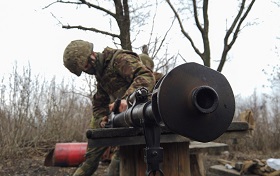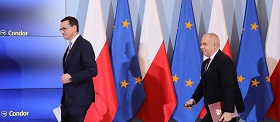Since the “war scare in Donbass is receding,” as Carnegie Moscow’s Director, Dimitri Trenin, argues, and Poland is to be found among the countries most fiercely lobbying for Ukraine’s membership in NATO—a move which not only risks escalating tensions with Russia but also has a great potential of being detriment of the possible U.S. attempts to “chart a new course” for Moscow, as is discussed by David Keene and Dan Negrea on The National Interest’s pages—and openly war-mongering against Russia, it’s time to evaluate this Central European country’s behaviour and assess it against the U.S. strategic interests in the region and at large.
Although it is generally perceived as the highest treason in Poland to be objective about Russia or Russians, it has to be remembered that in the course of the country’s long history there were conservative thinkers—most notably, Roman Dmowski, the chief ideological opponent of the Polish military and political leader Józef Piłsudski—who didn’t suffer from the main national “sickness,” as the sociologist Bronisław Łagowski referred to Poland’s approach to Russia in his famous book of the same title.
Many, like the former Minister of Foreign Affairs Dmowski, believe that especially now, when the world is rapidly changing, it is in Poland’s best interest to look critically on its history and national vices, not only for the sake of the nation and future generations but, above all, the future of our continent and civilization faced with a new challenge, China.
What is in Poland’s, as well as American and European, interest is to honestly re-evaluate the relations with Russia, because the current ones are, arguably, failing to serve either side’s interest.
The article's title reflects the name of the book by the Polish professor emeritus Bronisław Łagowski, originally published as ‘Polska chora na Rosję’.
Since the “war scare in Donbass is receding,” as Carnegie Moscow’s Director, Dimitri Trenin, argues, and Poland is to be found among the countries most fiercely lobbying for Ukraine’s membership in NATO—a move which not only risks escalating tensions with Russia but also has a great potential of being detriment of the possible U.S. attempts to “chart a new course” for Moscow, as is discussed by David Keene and Dan Negrea on The National Interest’s pages—and openly war-mongering against Russia, it’s time to evaluate this Central European country’s behaviour and assess it against the U.S. strategic interests in the region and at large.
Although it is generally perceived as the highest treason in Poland to be objective about Russia or Russians, it has to be remembered that in the course of the country’s long history there were conservative thinkers—most notably, Roman Dmowski, the chief ideological opponent of the Polish military and political leader Józef Piłsudski—who didn’t suffer from the main national “sickness,” as the sociologist Bronisław Łagowski referred to Poland’s approach to Russia in his famous book of the same title.
Many, like the former Minister of Foreign Affairs Dmowski, believe that especially now, when the world is rapidly changing, it is in Poland’s best interest to look critically on its history and national vices, not only for the sake of the nation and future generations but, above all, the future of our continent and civilization faced with a new challenge, China.
As the former communist country, which significantly suffered from the Soviet subjugation, Poland’s main goal was to move from a centrally-planned to a market-based economy and throw off the shackles of communism by aiming to re-join the European family of nations in order to get rid of the highly unjust backwardness stigma.
In doing so, the ‘shock therapy’ reforms were injected into the newly formed fabric of the Polish society, aiming to ‘Europeanize’ Poland.
The understandable desire to catch up with the Western neighbours resulted in implementing unprecedented hyper-liberalizing programs in the 2000s, which couldn’t be found in the West and weren’t required by the original policies of the Washington Consensus.
Warsaw didn’t stop with trade liberalization, price deregulation, enterprise privatization, currency convertibility, and monetary stabilization, to go even further and implement avant-garde reforms, including pension privatization and the flat tax, which could seldom be found in the developed or developing regions of the world.
Sadly, the entire motive of Poland’s actions was driven by the desire to oppose the East (and its own past), something rooted in the feeling of superiority towards Russia, on the one hand, and a deep inferiority complex towards the West, on the other.
Still haunted by the ghosts of the communist past, yet living in a new reality, the country produced a sense of deep alienation, with its population caught between the two worlds: physically finding itself in the present, yet still, regrettably, mentally living in the past.
The post-Solidarity victors (in order to prolong the longevity of their fame) started dividing Poles into the patriots of a better and a worse sort by playing the ‘communism card’ and trying to discredit their political opponents by labelling them as Kremlin’s agents and entirely forgetting about the neopositivists’ evolutional heritage of such prominent political figures of the Communist era as Stanisław Stomma, who was the head of the Catholic Znak group.
This toxic political climate resulted in a poisonous public sphere, where the Polish youth have been educated in the spirit of Russophobia, intentionally equated with anti-Sovietism.
Although Russia, like all other former members of the Soviet Union, is no longer communist, the Soviet-alike enemy narrative is still visible in schools, media and, most importantly, on the political scene where the spirit of Carl Schmitt’s philosophy nurtures the Polish aversion to Russia and the Russians and informs the meaning of ‘Polishness.’
This quaint version of xenophobia is associated with politically useful dark visions of the possibility of a Russian aggression and conquest (evoking the case of Ukraine in 2014), and are being skilfully inseminated in the minds of the public, which have lead to an increase of Russophobic sentiments and provided the government with carte blanche for (over)militarization of the country and urgent search for “hard” allied guarantees, such as the willingness to inherit the US nukes after Germany.
In the allegedly democratic country, dissenting voices like Professor Anna Raźny, a former head of the Department of Russian Modern Culture and director of the Institute of Russia and Eastern Europe at the Jagiellonian University, are sacked from their work in academia to become persona non grata in the intellectual circles, as they voice their support for healing deep historical wounds between the two nations.
This national “sickness” is official and institutionalized, and the pro-government forces and the mainstream media are guarding this national mental inaccuracy to keep this dangerous status quo in place.
Once you dare to step out of the line, you’re being labelled as “Putin’s agent” or “Kremlin’s useful idiot,” which prevents any sober dialogue about the country’s past, present and future, from taking place in the country less and less looking like liberal democracy, but rather, increasingly similar to its former communist version.
Besides, the very tactic supports the practice of historical revisionism, of which President Putin warned in his op-ed article published in June last year on The National Interest’s pages, as we’re witnessing the official denial of the objective version of history, as well as the negation of the historical narrative produced by the previous generations by fabricating entirely new facts. Hence, to call spade a spade, what Polish government is doing is create a fabricated version of history that has little to do with the actual facts. It is, in fact, falsifying history and manipulating facts for the purpose of a new ideologization and political propaganda.
What is especially dangerous about this behaviour is that it goes in line with the postulates of such prominent geostrategists as George Friedman, who argues that “Poland should lead other countries against Russia and Germany,” which somehow validates Poland’s national “sickness”.
To be honest, I don’t believe that this sort of vision, especially when it comes to Russia, is in the national interest of Warsaw or, in fact, Washington D.C. itself.
What is in Poland’s, as well as American and European, interest is to honestly re-evaluate the relations with Russia, because the current ones are, arguably, failing to serve either side’s interest.
Obviously, this is a two-way process, which should also involve the Russian side to contribute to the establishment of a stable normality between the two countries in the very least, as both countries need indeed to change their attitude towards each other.
This effort should concern the political will not only of Warsaw and Moscow, but also Washington D.C., which should serve as a catalyst of their rapprochement.
The most burning topics should cover “de-Ukrainization” of Poland’s eastern policy which is linked to the topic of anti-Russian rhetoric of Polish politicians and results in sweeping under the carpet of oblivion of the crimes Ukrainian nationalists committed towards Poles and Jews (i.e. Volhynia and Eastern Galicia), while the majority demands serious treatment of this issue, deeming it impermissible to offend their historical memory by attempting to cover it solely with unquestionable Soviet crimes.
The narrative of winning the debate about World War II fostered by Polish political elites 75 years after it ended should be condemned by the U.S., while the complexity of the historical conditions of this war should be left to professional (and depoliticized) historians, those who aim neither at practising propaganda nor at irrational chutzpah.
All of this, in my opinion, should serve as an impulse to look for new avenues of cooperation as well as serious reassessment of Poland’s and Russia’s common challenges and threats.
As Roman Dmowski famously wrote in 1930, “Russia’s destruction would be desirable from the point of view of many countries,” yet, he also warned, that “after all, the time would have come, and perhaps even soon, when European nations would notice and even feel that China is too close”.
Having said that, perhaps it’s time for Polish leaders to listen to Dmowski and finally start “loving Poland more than hating Russia”.







